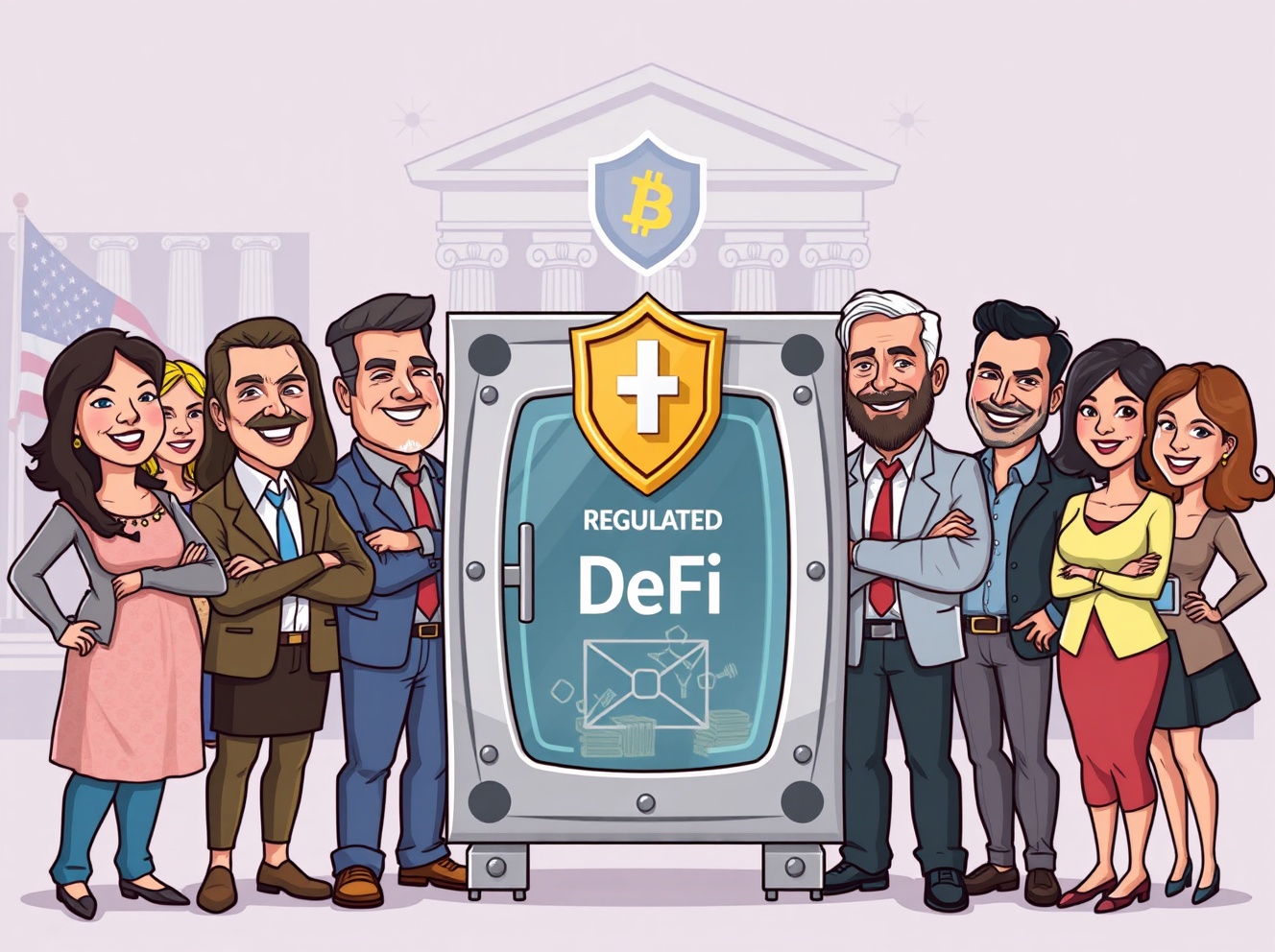4 in 10 Americans Ready for Regulated DeFi: A Pivotal Survey on DeFi Regulation
BitcoinWorld
4 in 10 Americans Ready for Regulated DeFi: A Pivotal Survey on DeFi Regulation
The world of decentralized finance, or DeFi, is often seen as a frontier, exciting but perhaps a little wild. However, a groundbreaking survey from the DeFi Education Fund reveals a surprising truth: a significant portion of Americans are ready to embrace DeFi regulation. This isn’t just a niche interest; it’s a clear signal that mainstream adoption hinges on establishing clear, thoughtful rules for this innovative financial ecosystem.
What’s the Buzz Around DeFi Regulation?
Imagine a financial system that’s open, transparent, and accessible to everyone, everywhere. That’s the promise of DeFi. Yet, for many, the lack of established guidelines has been a major hurdle. The recent survey sheds light on this hesitation, indicating that nearly half of all Americans are willing to dive into DeFi, but only if it operates within a regulated framework.
- Key Finding: 42% of respondents would use DeFi under a regulated framework. This figure highlights a strong desire for security and clarity.
- Payment Services Potential: Among those willing, a remarkable 84% expressed readiness to try DeFi-based payment services. This suggests a massive untapped market for innovative payment solutions.
This data points to a crucial intersection where innovation meets consumer protection. It suggests that appropriate DeFi regulation could unlock a new era of financial services for millions.
Why Are Americans Eyeing Regulated DeFi?
It’s not just about curiosity; there’s a deeper reason behind this willingness to engage with regulated DeFi. The survey also uncovered a significant lack of trust in existing financial systems. Only 29% of respondents believe the current U.S. financial system is truly safe.
This sentiment is powerful. It indicates that people are actively seeking alternatives that offer greater transparency, security, and fairness. DeFi regulation, when done right, can provide the assurance needed for individuals to confidently explore these new avenues. It’s about building bridges of trust between cutting-edge technology and everyday users.
Consider the benefits: enhanced consumer protection, reduced fraud risks, and a level playing field for all participants. These are the pillars upon which a trusted financial system, traditional or decentralized, must stand.
The Promise of Regulated DeFi Payments
The enthusiasm for DeFi isn’t limited to just financial products like lending or borrowing. A significant portion of the surveyed group expressed a strong interest in using DeFi for everyday transactions. The idea of regulated DeFi-based payment services is particularly appealing.
- Faster Transactions: Imagine sending money globally in minutes, not days.
- Lower Fees: Bypassing traditional intermediaries can significantly reduce costs.
- Greater Control: Users maintain more direct control over their funds.
These advantages, combined with the security provided by clear DeFi regulation, could revolutionize how we think about and use money daily. It’s about creating more efficient, inclusive, and user-centric payment experiences.
Navigating the Path to Mainstream DeFi Regulation
While the demand for regulated DeFi is evident, the path to achieving it is complex. Regulators face the challenge of understanding a rapidly evolving technology while simultaneously protecting consumers and fostering innovation. This isn’t a simple task, but the survey provides a clear mandate for action.
Key Considerations for Effective DeFi Regulation:
- Clarity: Establishing clear definitions and legal frameworks for DeFi protocols and assets.
- Consumer Protection: Implementing safeguards against scams, hacks, and financial exploitation.
- Innovation: Crafting rules that don’t stifle technological advancement and growth.
- Global Coordination: Harmonizing regulations across different jurisdictions to prevent arbitrage and ensure market stability.
The future of finance could very well be decentralized, but its widespread adoption depends heavily on thoughtful and effective DeFi regulation. It’s a collaborative effort between innovators, users, and policymakers to build a financial system that serves everyone.
Summary: A Clear Call for Action
The survey from the DeFi Education Fund delivers a compelling message: Americans are ready for DeFi, but they want it to be safe and sound. The willingness of 4 in 10 respondents to engage with regulated DeFi, coupled with the strong interest in payment services, underscores the immense potential of this technology. It also highlights a critical opportunity for regulators to step up and provide the clarity and oversight necessary to unlock DeFi’s full promise. The future of finance is evolving, and DeFi regulation will be a cornerstone of its mainstream success.
Frequently Asked Questions About Regulated DeFi
Q1: What is DeFi?
A1: DeFi, or decentralized finance, refers to financial services built on blockchain technology. These services, like lending, borrowing, and trading, operate without traditional intermediaries such as banks, using smart contracts instead.
Q2: Why do Americans want DeFi to be regulated?
A2: Americans desire regulation for DeFi primarily for security and trust. Many are wary of unregulated financial systems due to potential risks like fraud, hacks, and lack of consumer protection. Regulation can provide a framework of safety and legitimacy.
Q3: What benefits could regulated DeFi offer?
A3: Regulated DeFi could offer several benefits, including enhanced consumer protection, reduced risks of scams, greater transparency, potentially faster and cheaper financial services (especially payments), and increased trust, leading to broader adoption.
Q4: How does DeFi regulation compare to traditional finance regulation?
A4: Traditional finance operates under well-established, comprehensive regulatory frameworks. DeFi regulation is still evolving and aims to apply similar principles of consumer protection and market integrity to a decentralized, blockchain-based environment, often requiring new approaches due to its unique technological characteristics.
Q5: What are the challenges in implementing DeFi regulation?
A5: Challenges include the decentralized and global nature of DeFi, which makes enforcement difficult; the rapid pace of technological innovation; defining which entities are responsible for compliance; and ensuring regulations foster innovation rather than stifling it.
Found this article insightful? Share it with your friends, colleagues, and anyone interested in the future of finance and the exciting potential of regulated DeFi! Your shares help spread awareness and foster important conversations.
To learn more about the latest crypto market trends, explore our article on key developments shaping DeFi institutional adoption.
This post 4 in 10 Americans Ready for Regulated DeFi: A Pivotal Survey on DeFi Regulation first appeared on BitcoinWorld.
You May Also Like

Venezuela Plans To Add Bitcoin And Stablecoins To The National Banking System

10 Top Cryptos for Long-Term Investors Seeking Passive Income and High ROI

Revolut Launches 1:1 Stablecoin Conversions with Zero Fees for 65 Million Global Users
Highlights: Revolut now offers zero-fee USD to stablecoin conversions for its users across six major blockchains. The fintech reported a huge profit, driven by rising crypto trading and platform expansion in Europe. Stablecoin conversions strengthen Revolut’s global reach as it prepares for US entry and possible dual market listing. Revolut has added a new feature that lets users change USD into stablecoins and vice versa at a 1:1 rate. The digital bank got rid of all conversion fees and spreads, so users can now exchange up to $578,630 every 30 days without paying any extra fees. The feature works with both USDC and USDT on six major blockchains, such as Ethereum, Solana, and Tron. Revolut has just made a major crypto move! Users can now swap USD to $USDC or $USDT 1:1 with zero fees or spreads — available across six blockchains. A huge step toward mainstream stablecoin adoption. Could this set a new standard for fintechs? #Revolut #Fintech… pic.twitter.com/qZqbx2tQHg — CryptoMoses (@realcryptomoses) October 31, 2025 Leonid Bashlykov, Revolut’s Head of Product for Crypto, said the goal is to remove friction between fiat and digital assets. He explained that customers will now receive exactly $1 in stablecoins for every $1 exchanged. Bashlykov shared the update on LinkedIn, describing it as a way to simplify how people move between cash and crypto. Revolut reported that the spread will be covered internally as long as both stablecoins maintain their pegs. The rollout follows Revolut’s recent approval under the Markets in Crypto-Assets Regulation framework. The company received a license from the Cyprus Securities and Exchange Commission, enabling it to offer regulated crypto services across 30 European Economic Area countries. Bashlykov added that the 1:1 rate is not about gaining a better deal but about eliminating the anxiety of moving on and off blockchain systems. Expanding Crypto Services and Rising Revenue Across Europe Revolut has been expanding in Europe. Meanwhile, the fintech company reported £1.1 billion in profit last year, a 149% increase from the previous year. The company achieved £3.1 billion in total revenue, primarily due to strong growth in crypto trading, subscriptions, and lending. The company’s wealth division, which includes trading services, crypto, and commodities, made £506 million in sales. Revolut launched Revolut X, a professional trading platform for advanced traders. The platform offers trading in more than 100 tokens with 0% maker fees and 0.09% taker fees. It now operates in 30 European countries and integrates TradingView charts and analytics. Revolut partnered with Consensys in March to launch Revolut Ramp, which lets people buy crypto directly through MetaMask wallets. Later in the year, it partnered with Ledger to let people buy crypto through Ledger Live. The company has $35 billion in customer assets, and it serves more than 65 million people worldwide. Its Crypto Learn feature, which teaches people about cryptocurrencies, keeps bringing in new investors who want easier ways to understand the market. Global Strategy and Growing Role in Stablecoin Conversions Revolut’s focus on stablecoin conversions fits with its greater plan for expansion. The business intends to invest more than €1 billion into France by 2028 and set up its Western European headquarters in Paris. It is also trying to get into the U.S. by acquiring a nationally chartered bank, which would speed up the process of getting a license. Reports indicate that Revolut could secure $1 billion in new funding, which would make the company worth about $65 billion. The firm is reportedly exploring a dual listing in London and New York, which could make it one of the top 15 firms on the London Stock Exchange. Revolut is exploring a dual listing in London and New York, targeting a $75B valuation, per The Sunday Times. If it happens, it'd be the first to enter FTSE 100 while listing in NY. Serves 65M users, including 12M in UK. #Fintech #IPO — Vincent Bu Lu (@VincentBuLu1) September 29, 2025 Revolut’s latest update arrives as other major payment firms move toward blockchain settlements. Western Union plans to roll out a stablecoin-based system by 2026, while Zelle and MoneyGram are developing similar products to improve cross-border transfers. eToro Platform Best Crypto Exchange Over 90 top cryptos to trade Regulated by top-tier entities User-friendly trading app 30+ million users 9.9 Visit eToro eToro is a multi-asset investment platform. The value of your investments may go up or down. Your capital is at risk. Don’t invest unless you’re prepared to lose all the money you invest. This is a high-risk investment, and you should not expect to be protected if something goes wrong.